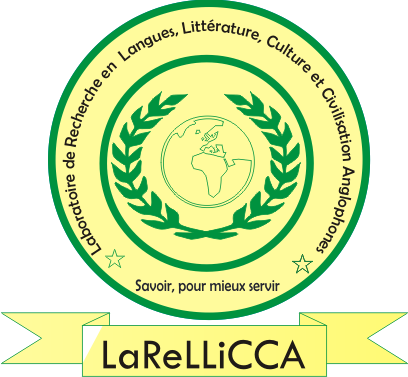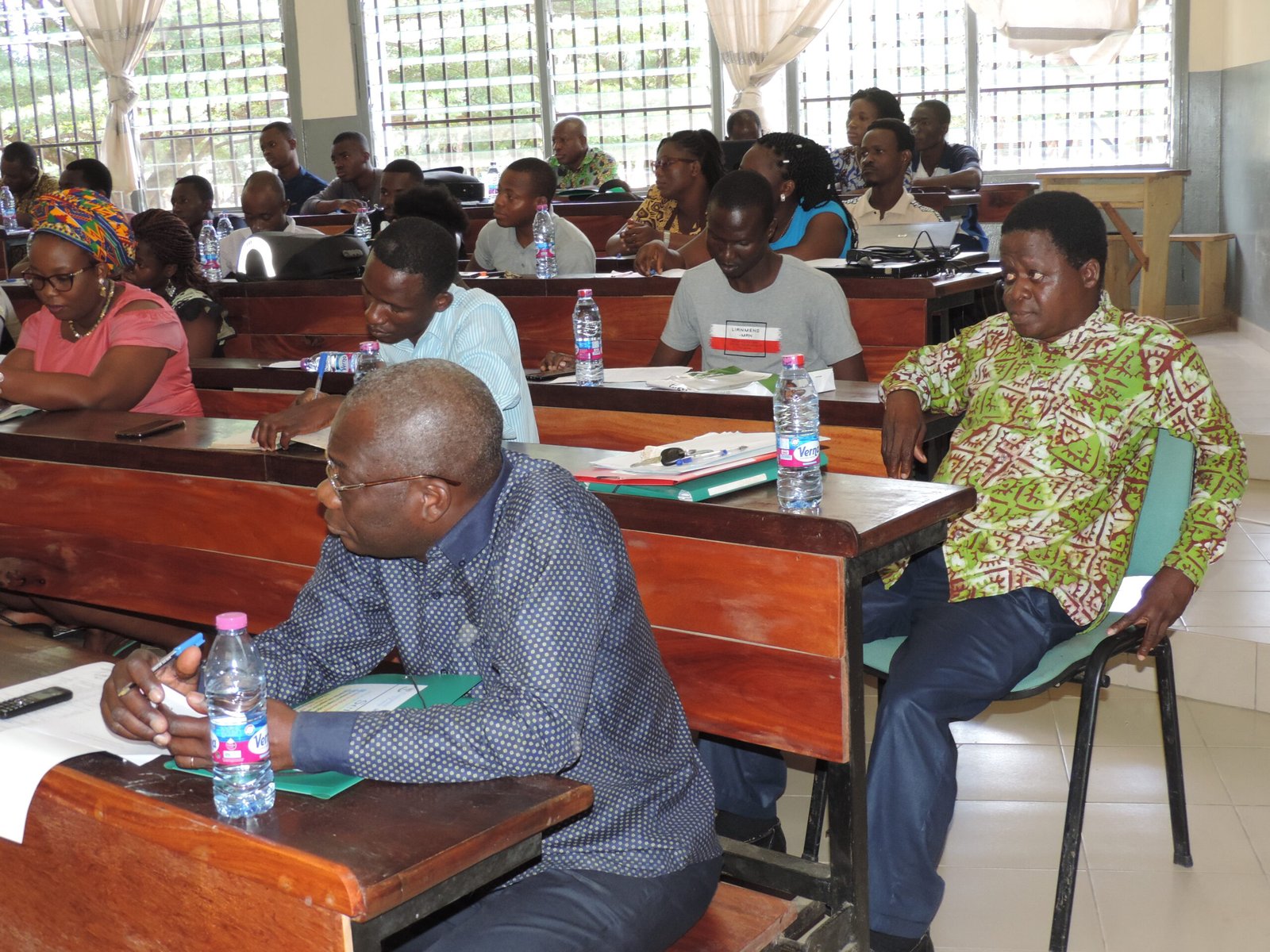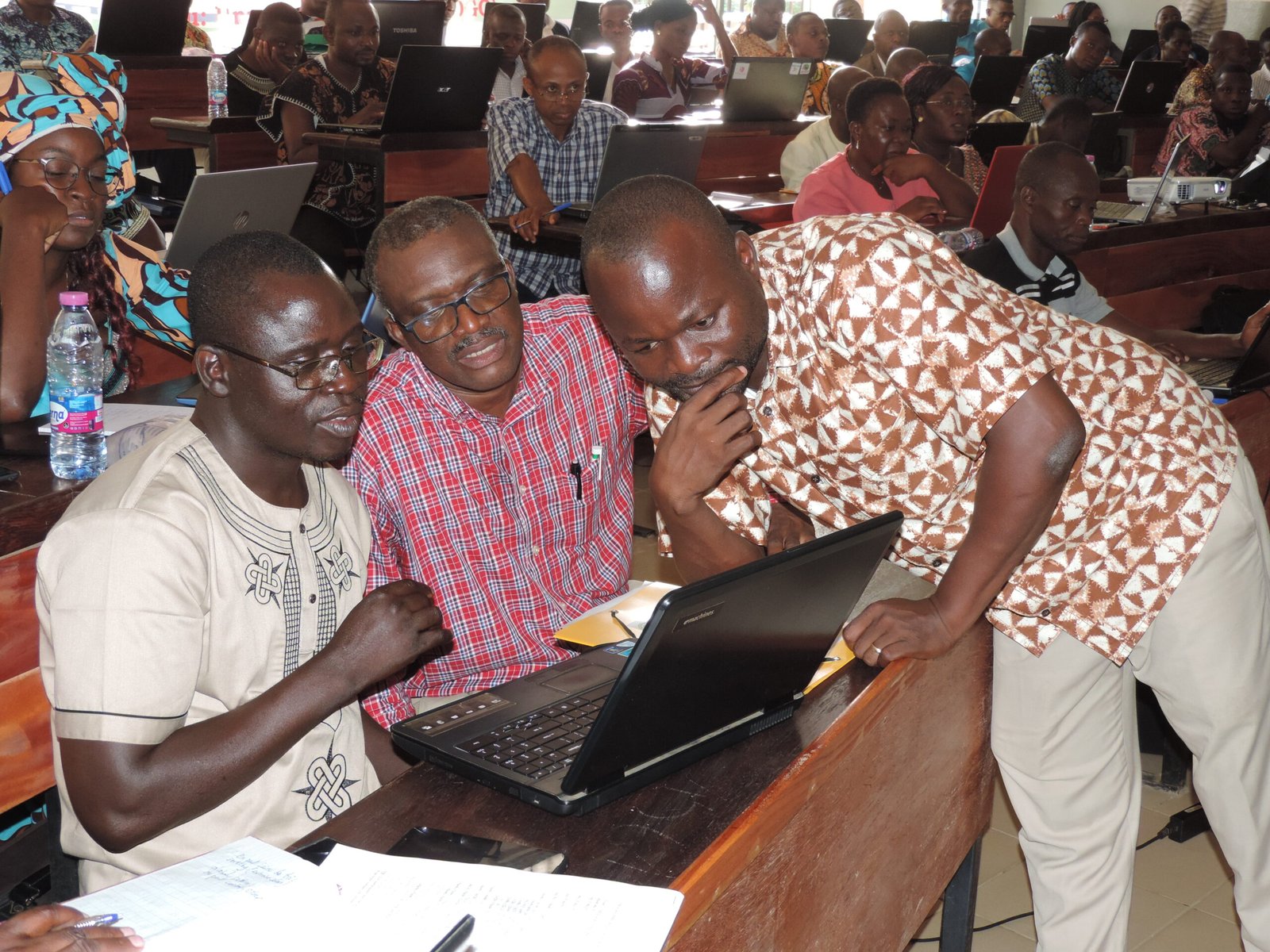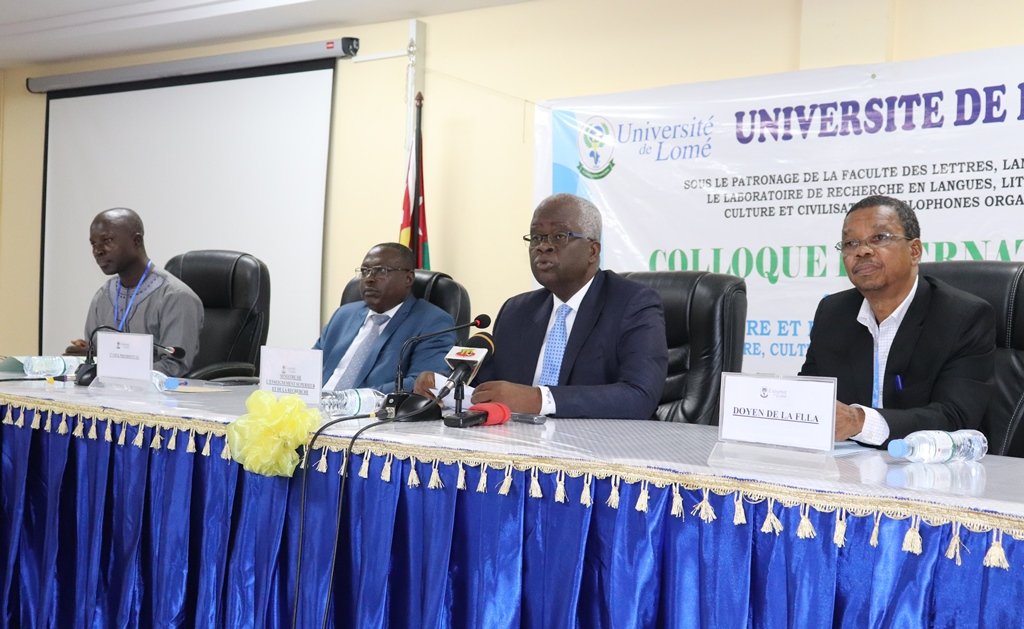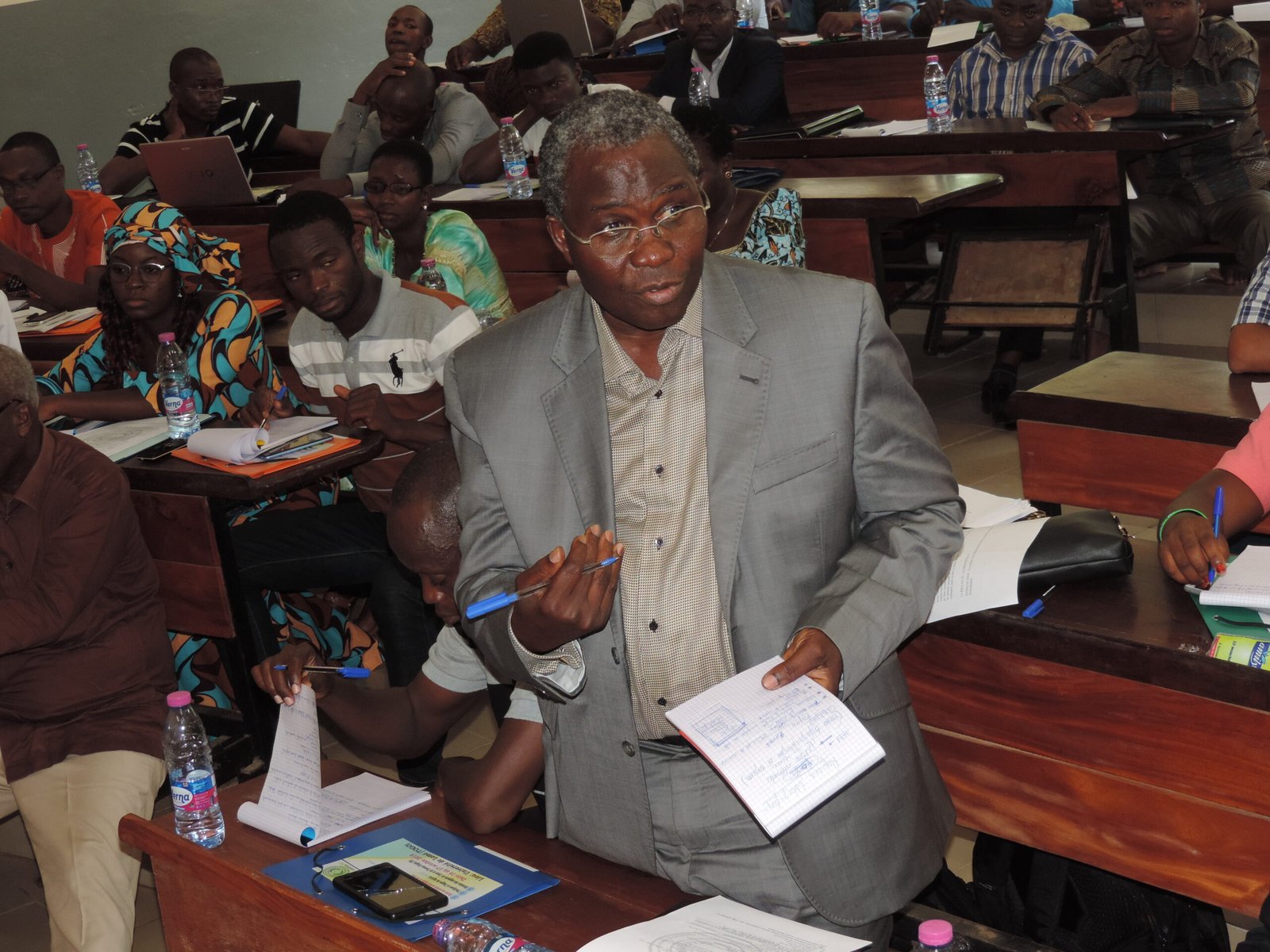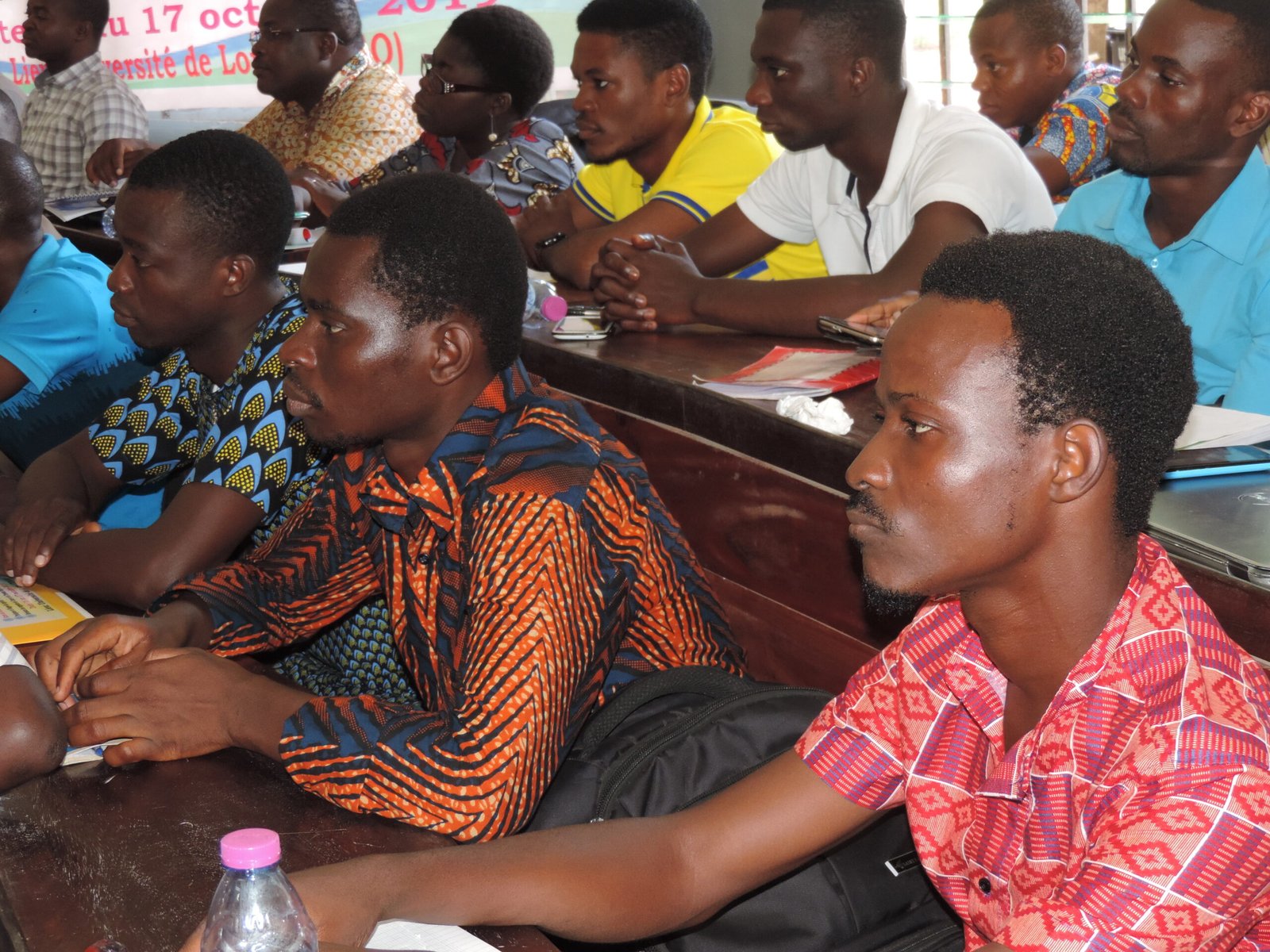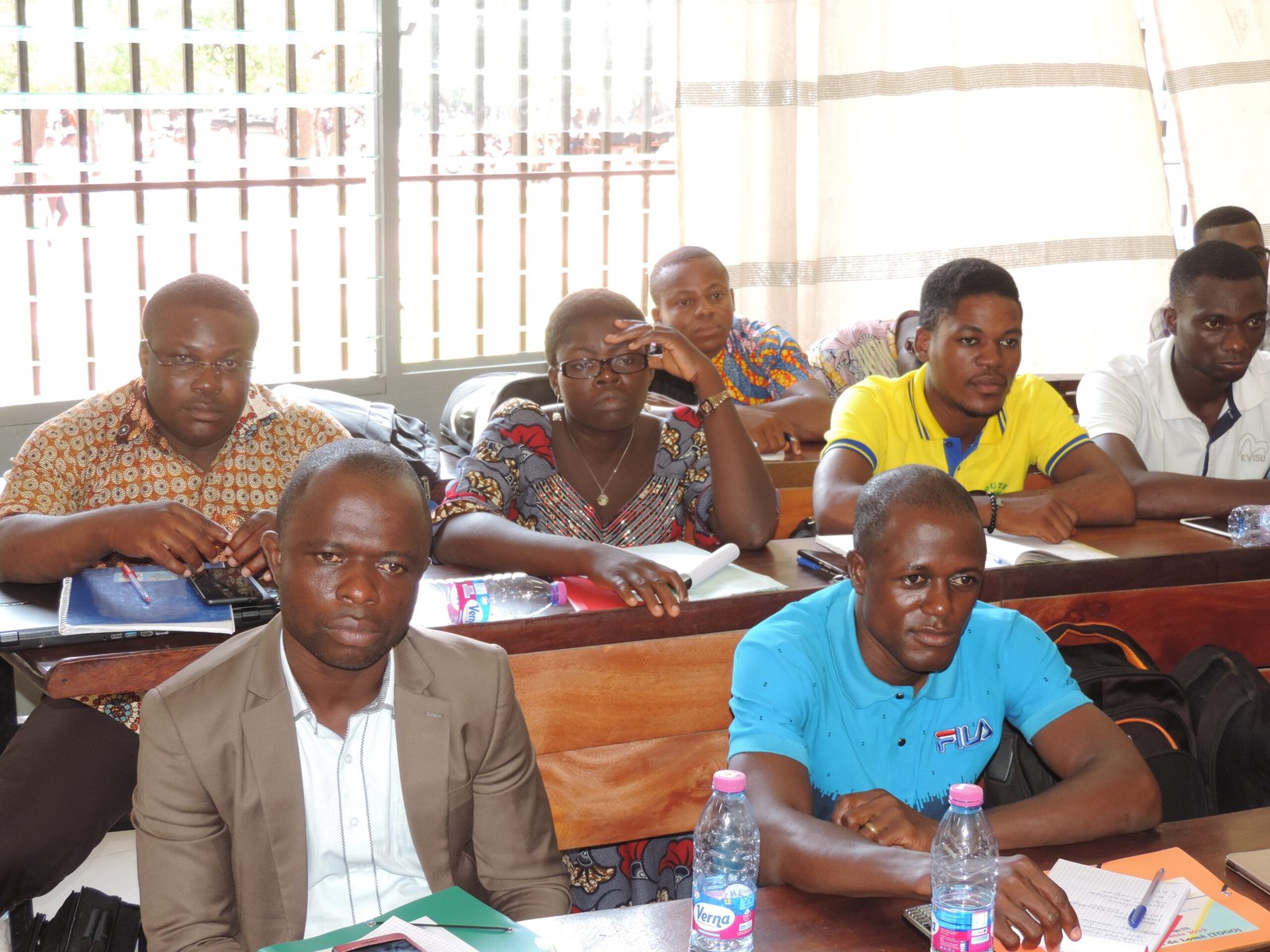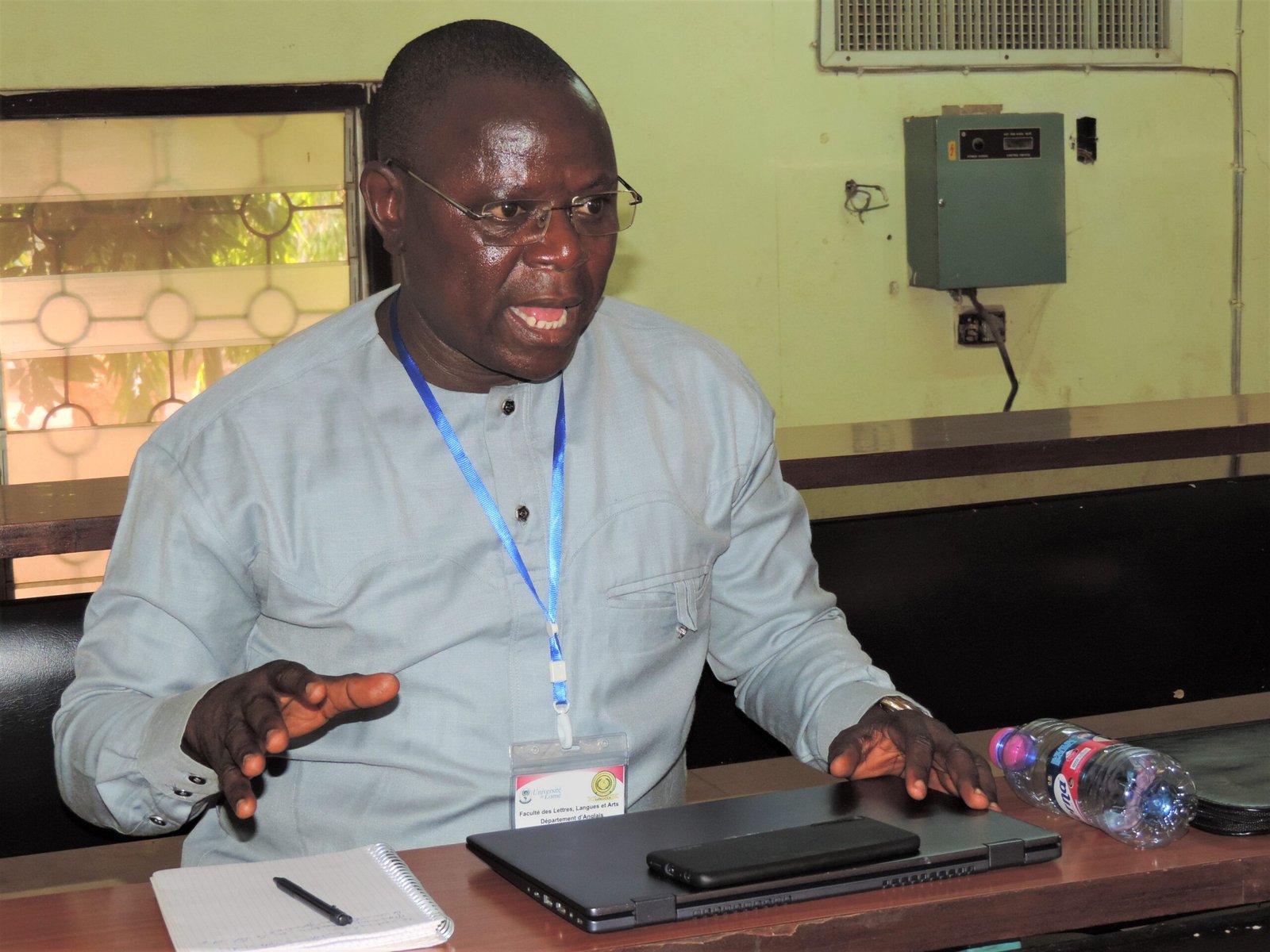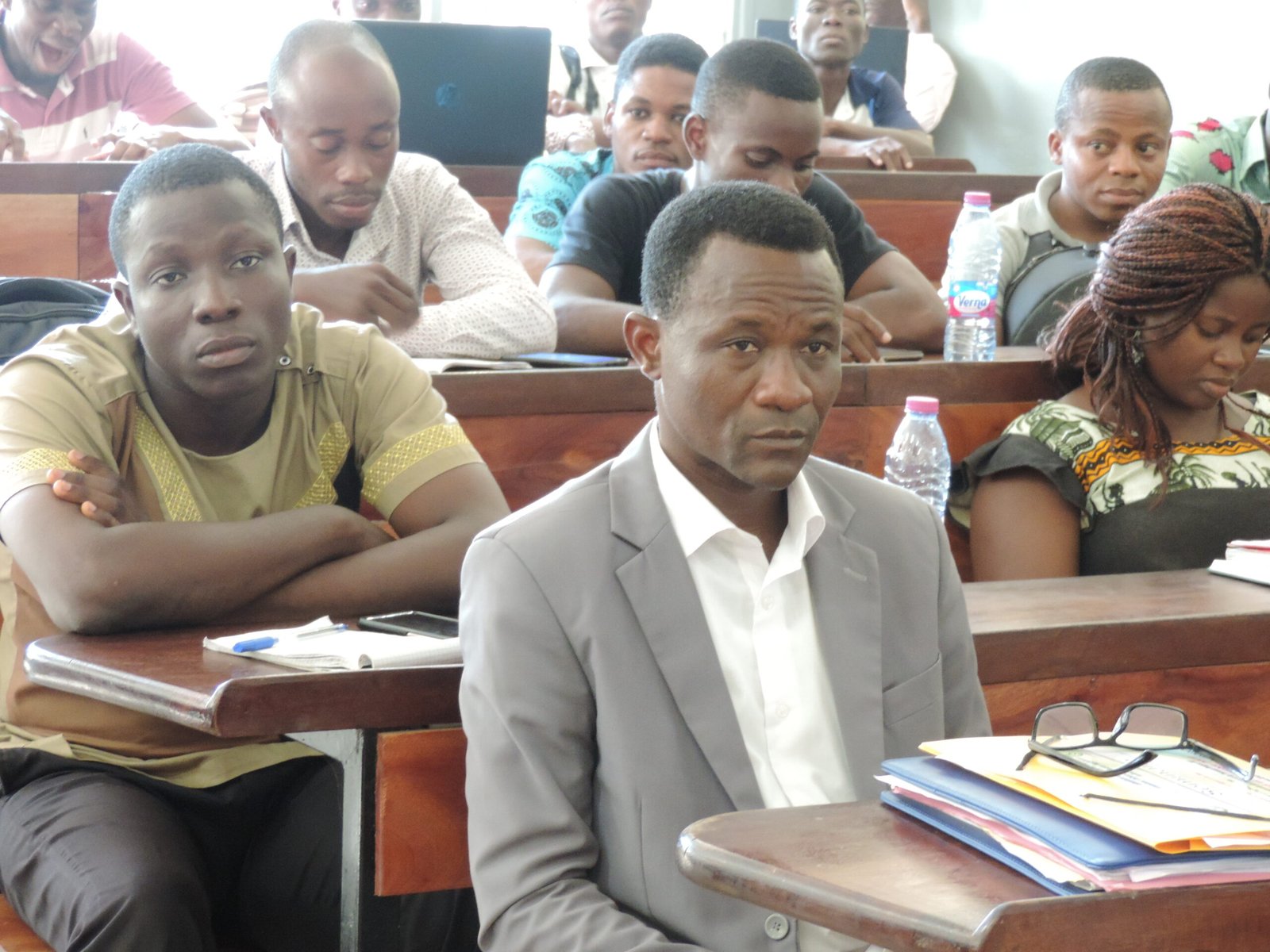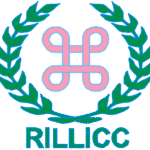ISSUE N° 2
Article 1: De la guerre et de la paix dans le récit de l’enfant soldat : une lecture péjoristique de Sozaboy de Ken Saro-Wiwa
Klohinlwélé KONE
Université Félix Houphouet-Boigny
nielfang@yahoo.fr
Abstract:
The aim of this study is to show that literature can deal with serious or painful issues like war in a light and humorous narrating mode. It also shows that a great literary work can be produced with an informal or
‘rotten language’ that rejects the accepted syntactic and grammatical norms. The pejoristic approach used in addition to some theoretical tools of the postcolonial approach to conduct the analysis enables to show that the events narrated develop from a positive point to a negative one, from a joyful innocence towards disillusion and suffering. By this rhetorical device, the study revealed the writer shows his anti-war option and advocates peace.
Keywords : pejorism, explicit/incipit, idelogical apparatus, carnivalistic
combination, focalization.
Article 2: Territorialité et paix dans Le Lieutenant de Kouta de Massa Makan Diabaté et La vie et demie de Sony Labou Tansi
Eyanawa TCHEKI
Université de Lomé
tchekson4@gmail.com
Abstract
This study assesses the semantic scope and the narrative implications of the concept of territory in relation to power and peace through Le Lieutenant de Kouta et La vie et demie. The study argues that speech acts determine the social classes and interpersonal relations of participants. In the light of Marxist criticism and with an eclectic approach to Semiotics, the study has found that power management, regardless of responsibility, is conducive to division of human race into classes and source of trauma.
Keywords: spirituality, trauma, representation, space, life.
Article 3: La problématique du patriotisme dans Le capitaine Alatriste de Arturo Pérez-Reverte
Madéla Seyram BOUKARI
Université de Lomé
Département d’Etudes Ibériques
Littérature espagnole
kokoboukari@yahoo.fr
Abstract:
This study makes a thematic analysis of patriotism in Arturo Pérez-Reverte’s The Captain Alatriste. Through the thematic approach, the study points out that the main character in this work carried out acts that contributed to the consolidation of peace and stability in Spain to the detriment of his own personal interests. In short, it shows that without patriotism there is no true culture of peace in a nation.
Keywords: Society, patriotism, interests, peace.
Article 4: The Dent of Domestic Violence on Peace and Justice
Patchani Essosimna PATABADI
Université de Lomé
ornellacamilla@gmail.com
Abstract:
The aim of this study is to use the creative work of Andreas, The Purple Violet of Oshaantu, to shed light on the consequences of domestic violence in African communities, and how the collective grassroots respond to it in the attempt to effectively put an end to it. The study borrows from cultural studies’ “commitment to an ethical evaluation of […] society” and its feminist advocacy of agency of the active culture consumer. It finds that some institutions and individuals delay the end of domestic violence, which violates the rights of women and deprive them of peace.
Keywords: domestic violence, victim blaming, peace, justice, cultural
studies, feminism, agency.
Article 5: Towards Humanising Individual Desires: From Iconoclastic to Allegorical Reading of the Epic Gassire’s Lute
Kangnivi KODJOVI
Université de Lomé
kodjoson@hotmail.fr
Abstract:
This work discusses the interrelationship between personal desires, ambitions and societal laws in a conflicting atmosphere. It also points to the raising of social responsibility as a stop to individual’s drive for lawlessness in society. It is believed the instabilities observed here and there all over the world are mainly motivated by different ambitions that the authors refuse to relinquish for the sake of the societal harmony and peace. And because such people are powerful and influential, their desires are not often evaluated or controlled at the right time.
Key words: desire, ambition, power, society, morality, laws, and respect.
Article 6: The Rhetoric of Peace in McBagonluri’s Tears of a Rain Goddess and Nyantakyi’s Ancestral Sacrifice
Idjadi Aminou KOUROUPARA
Université de Lomé
aminouk@yahoo.fr
Abstract:
The inability of humans to mutualize their differences for a better world and a harmonious living together creates desolation and socio-political chaos. This study examines McBagonluri’s and Nyantakyi’s literary reconstruction of peace and community happiness. Pewissi’s mediation ideology of womanism is used in this study to identify elements that corrode justice and social tranquility. The study found that mutual respect and mediation by religious leaders are important means of fostering dialogue and living together that ensure social harmony and sustainable development.
Key words: community, extremism, exclusion, difference, peace.
Article 7: Ethical Reading and Creative Justice in Covid Period: A Postmodern Perspective on Ngugi wa Thiong’o’s “Dawn Of Darkness”
Damlègue LARE
Université de Lomé
laredamlegue@gmail.com
Abstract
This article analyses Ngugi’s critical thoughts on the remaking of values due to the covid 19 lockdown experiences from postmodern theoretical approach. The study explains the concept of creative justice as asset to peace and argues that literature can contribute to peace and create a bridge between the sudden fracturing of social brotherhood and the new individualism created by the lockdown during covid19. In practice, Covid 19 has broken the traditional connectivity of humans and challenged humanness.
Key words: ethics, justice, peace, covid 19, postmodernism.
Article 8: Dramatic Devices: Effective Means for Socio-PoliticalTransformation and Reformation in Frank Ogodo Ogbeche’s Harvest of Corruption
Panaewazibiou DADJA-TIOU
Université de Kara-Togo
dadjatiouespoir@yahoo.fr
Abstract
This study aims at showing how the playwright, Ogbeche, uses dramatic techniques as tools for peace-related transformation and reformation of post-colonial African societies. Using stylistics as the theoretical approach and the methodology of discourse analysis, it has been established that dramatic devices such as poetic justice, satire, irony, contrast and verbal arts can be used to ridicule human failure and secure justice, peace and human rights. The study has found that failure to do so causes boomerang effects of anarchy, bad governance and violation of human rights.
Keywords: stylistics;
Article 9: Breaking Adversity: A Literary Option for Constructing Peace in Anyidoho’s The Place We Call Home
Koffi Blèwussi KENAVOR
Université de Lomé
kenavorkoffi@gmail.com
Abstract:
This study examines the literary articulation of breaking the adversities engendered by European obsession of hegemony in Kofi Anyidoho’s The Place We Call Home. From Hallidaian semiotics perspective and Womanist approach, the textual analysis of diction, tone, mood and themes in the poems reveals that the poems materialize a mediation between conflicting forces so as to achieve social peace, harmony and stability.
Keywords: Breaking, adversity, hegemony, mediation, social peace.
Article 10: Contrasting Two Ways of Maintaining Peace in Tears of A Rain Goddess
Djignéfa A. AGOUZE
Université de Lomé, Togo
agouzablam83@gmail.com
Abstract
This work argues revenge, compliance, marriage and dialogue as two ways of maintaining peace in the fictional world of Diana Bamford McBagonluri. The social concern of the topic hints at the dynamics of maintaining peace through a discourse that exhibits war, revenge, and dialogue as two contrasting ways, which McBagonluri suggests for the promotion of peace in the society. Through the use of Conflict theory, the study points at injustice, compliance, marriage, revenge, rape, and war as destroyers of peace. It finds that the use of permanent dialogue guarantees sustaining peace.
Keywords: dialogue, discourse, dynamics, peace, revenge
Article 11: Solving Gender Conflicts for Sustainable Peace in Suzan-Loris Parks’s Venus
Afi Mawuko KECHIE
Université de Lomé
thildaqueen@yahoo.com
Abstract
This work illustrates how Parks calls on individual groups to resolve conflict affecting the weak and possibly prevent conflictual problems from rising. Gender issues, insecurity, poverty, conflict and limited access to peace and justice remain a great threat to sustainable development, which grounds this topic. Through the use of the theory of Conflict, the study has concluded that gender conflict and self-interest are not only a sword and a shield for protection against totalitarian individuals but a platform against peace, liberty and freedom.
Keywords: conflict, gender, poverty, peace, individual, society
Article 12: Les universités publiques et le projet national d‟excellence et de paix
Komi KPATCHA
Université de Kara
kosimon2011@gmail.com
&
Ataféï PEWISSI
Université de Lomé
sapewissi@yahoo.com
Abstract:
This study shows that public universities are accountable to governments that own them. It argues that national development is the business of these universities through researching. Excellence and peace projects are pathways to university curricula proned to development as a means to contribute to the achievments of social needs thanks to researchers‘ contributions in the field. The theoretical framework and methodology is based on Bhabha‘s (2007) interpretation of post-colonial theory that substantiates relations of influence, agression and resistance among humans. The use of this framework has made it possible to conclude that the educational systems can help promote peace and secure development through qualitative leaps.
Key words : Public universities, project, excellence, sustainable peace,
intelligence.
Article 13: Political Authority and Civil Disobedience in the United States of America: An Insight into the Conflict between the Needs of the State and the Right to Disobey Laws
Sènankpon Raoul AHOUANGANSI
Université d’Abomey-calavi9
peacemakersouls@yahoo.fr
Abstract
This article sheds light on the mismatch between political authority and civil disobedience regarding the American justice. Based on Marxist critical theory of class and responsibility, this study has established that the American political thought reflects in one way or the other that state of ambiguities, paradoxes and dilemmas which builds the whole history of Americans. While authority is seen as the existence of established rules that entitle one individual or few persons to represent people, civil disobedience rests upon the assumption that the individual is the ultimate source of authority.
Keywords: American – authority – disobedience – principle – justice.
Article 14: ‘‘Fracture’’ discursive bipolarisée au Togo : recherche d’un new deal langagier pour la culture de la paix
Essodina Kokou PERE-KEWEZIMA
Université de Lomé
pereesso2006@yahoo.fr
Abstract:
Verbal discourses of speakers of a given language sometimes integrate some appreciative or disappreciative constructions towards an individual or a linguistic community. Concerning disappreciative constructions, for example, they are sometimes attested in the speeches of some Togolese with a discursive bipolarized fracture that is hatred and dividing of Togo into ‘’north’’ and ‘’south’’. This verbal behavior can disturb the living together and social peace in the country. The objective is to study the bipolarised verbal constructions containing lexical and morphosemantic germs of that discursive fracture. The methodological approach consists in a collection of data extracted from political discourses and speeches of some Togolese. As far as theories are concerned, two approaches are used in this work: the discourse analysis theory and the theory of Gradable vs non-Gradable Construal of Properties. The results awaited: Togolese speakers of one of the Togolese national languages are more conscious of the reverse side of language and promote a language new deal that would rather favor culture of peace in Togo.
Keywords: discourse; fracture; bipolarised; language new deal; peace.
Article 15: La langue au service de l’éducation pour la paix et la cohésion sociale
Essobozouwè AWIZOBA
Université de Kara
essobozou@gmail.com
Abstract:
Language is the ideal medium of communication among the members of a given community. Its role in the education and modeling of human character is essential. This study, taking a pragmatic approach, aims to show the influence words can have on human behavior, whether violent or calming. The theoretical approach for this study is the verbal communication, with a focus on the educational and socializing implications of language as an essential tool of interpersonal communication. Building on Kabiye language, the study found that every language can shape its speakers in building or destroying peace.
Keywords: language, education, peace, violence, language, Kabiye.
Article 16: Investigating the Historical and Sociopolitical Lethal Effect of Language: A Semantic Study of the Causality Between the Hutu-Tutsi Otherness Discourse and the Genocide Outbreak in Rwanda
Cocou André DATONDJI
Université d’Abomey-Calavi
datondjia@yahoo.fr
Abstract:
This paper is a semantic investigation of the cause-effect relationship between the Hutu-Tutsi otherness discourse and the outbreak of the 1994 genocide in Rwanda. The semantic analysis carried out is based on extracts from various sources such as investigative documents, court reports and media publications and broadcastings related to the genocide. Using qualitative method, the study came to the conclusion that the longrun manipulative use of language resulted into semantic shifts with changes from denotative to connotative meanings that played a large part in the genocide.
Key words: Public Speech, Otherness, Semantic shift, Speech Act, Identity Construction.
Article 17: Management of the Connection between Language Diversity and Social Peace
Ulrich Orlando Sèna HINDEME
Richdeme11@gmail.com
&
Pédro Marius EGOUNLÉTI
pedmareg@yahoo.fr
&
Coffi Martinien ZOUNHIN TOBOULA
marcomfr2002@gmail.com
Université d’Abomey-Calavi
Abstract:
This study investigates the parallel between linguistic diversity within a society and its (society) chances of enjoying peace while using a semistructured interview as a core instrument for data collection. Fifty-six (56) EFL teachers have joined one hundred, and twenty-eight (128) advanced learners as participants in this study. The results reveal that linguistic diversity is an important tool for bringing different culturemeshed individuals together for constructive dialogues.
Keywords: Language, diversity, peace, management, culture, society.
Article 18: University Pedagogy: A Pathway to Development and Peace
Akponi TARNO
Université de Lomé
tarnoakponi@gmail.com
Abstract
This study investigates the impacts of university pedagogy on the building of development. It argues that a well-planned university teaching in accordance with everyday changes and challenges constitutes an appropriate path towards security and development at every level. Both a quantitative and a qualitative data collected from students at Université de Lomé and analysed through the Socio-constructive approach show that only a pedagogy that goes beyond approaches to teaching and fixed goals and develop specific skills enables university students to easily enter the job market.
Key words: pedagogy, approach, skill, change, challenge, job
